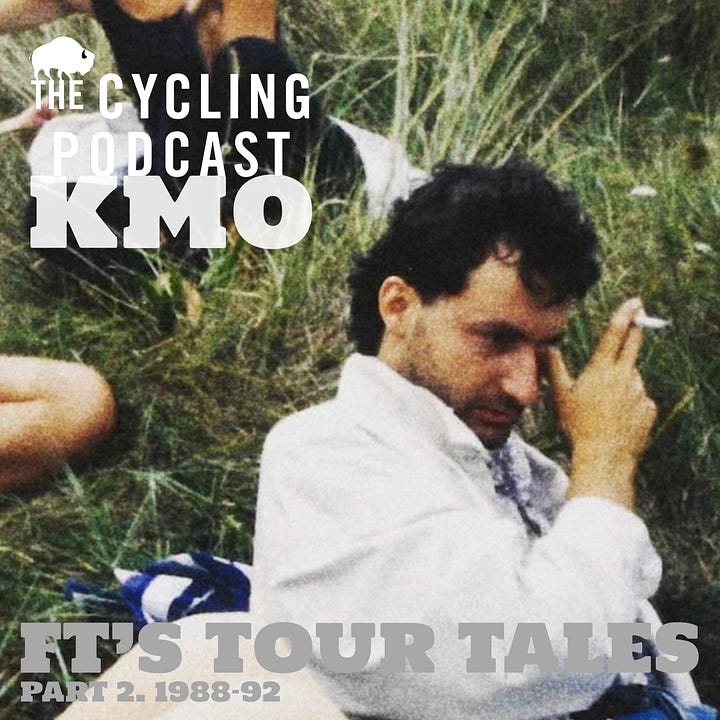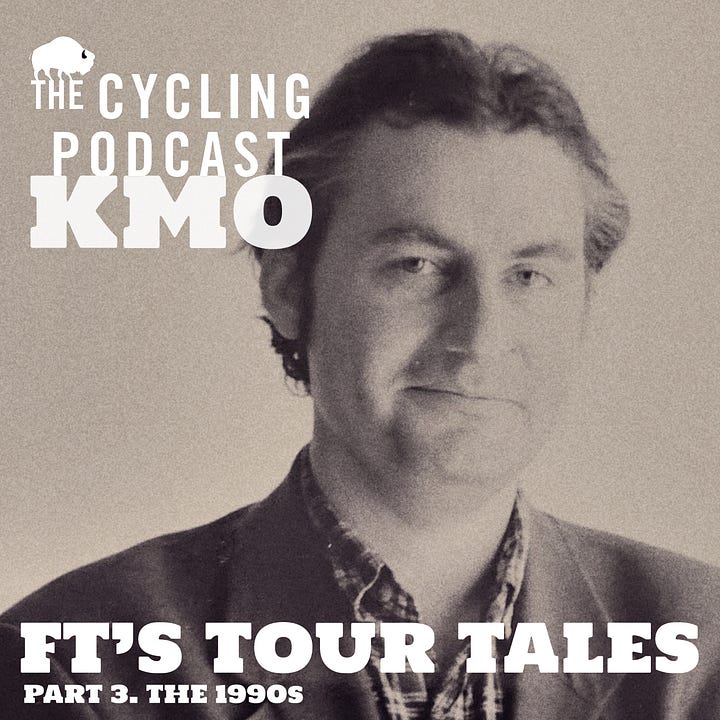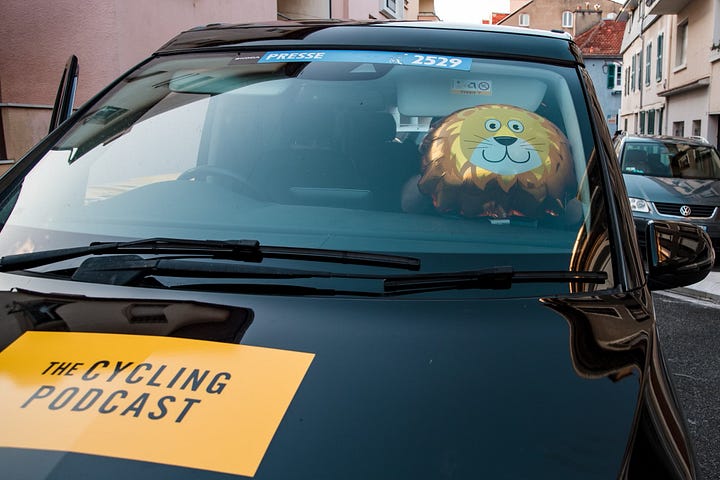A Tour of seconds... but for how long?
The Tour de France is poised for a dramatic conclusion in the final week
by Lionel Birnie
As I write this, Jonas Vingegaard leads Tadej Pogačar by just ten seconds. It may lack the to-and-fro drama of 1989 but the battle is so delicately-poised and the rivals so evenly-matched this has undoubtedly been the most absorbing Tour for many years.
On Sunday afternoon in St Gervais-Mont-Blanc, Ian Boswell and I escaped the steaming hot press tent, which felt like sitting in a greenhouse as it baked in the afternoon sun. We sat there in neat rows, us journalists, like slowly-ripening tomatoes until I knew I had to get out into the relatively cool, fresh mountain air.
All the cafes were busy, their terraces full of people in town to watch the Tour de France, but we spotted a vacant couch overlooking one of these terraces and sat down. The couch had seen better days, its grey leather was cracked and worn and the cushions almost collapsed under us as we sat. We ordered a cold Coke and watched the race on the big screen opposite us.
While he was with The Cycling Podcast this past week, Ian had been recording bits for his own podcast, Breakfast with Boz, and he took out his recorder and asked me a question that, momentarily, stalled me.
* * *
The weekend’s logistics were turning out to be slightly more challenging than usual, even by Tour de France standards. On Saturday night we arrived at our hotel in Les Gets, which was due to host the start of Sunday’s stage, to a bustle of activity. Lorries and fork-lifts were reversing, barriers were being set up, and we spent half an hour debating where to park. Our hotel’s car park had been commandeered by the Tour de France as the site for the Village Départ and cars that had been parked in spite of the warning notices were being towed and dumped unceremoniously on the adjacent overgrown grass. We considered parking on the street but were told that we’d end up blocked in by the barriers. So we took a gamble and left The Cycling Podcar – our broomwagon – on the grass verge in the area that would be reserved for press parking, hoping our official sticker would mean we’d be okay overnight.
I put in my earplugs to block out the banging of barriers and beeping of the reversing vehicles and went to sleep. Staying in the start or finish town looks great on paper, I thought, but sometimes it’s possible to be too close to the Tour de France.
In the morning, I woke up, opened the shutters and right outside my window was the start line and to my left the Village Départ had sprung up overnight.
I checked my phone. Ian, who had got up early to go for a bike ride, had sent a message on WhatsApp. ‘Van’s still here.’ One-nil to The Cycling Podcast.
Our hotel check-out time was 10am, which struck me as far more convenient for the hotel than for the guests. Ian’s request for a later check-out was denied, so we decamped to a cafe until the team buses arrived.
Then it was off to the finish in Saint-Gervais. I threaded the van down, down, ever-deeper down into an underground car park that was supposed to be reserved for press and official vehicles only to reach the bottom to find it was completely complet. So we unwound ourselves, meeting other cars coming the other way. When we emerged back into the bright sunlight we saw one of the Tour staff who told us with a shrug what we already knew. The car park was full.
‘Where should we park?’ we asked.
‘Good question,’ he said.
In the end, we parked on the pavement about a kilometre up the hill out of town and hoped our official Tour de France sticker would grant us immunity from being towed away.
* * *
On the Tour, you always have to be thinking half a day ahead so my mind turned to the evening’s accommodation. I’d booked a very nice looking chalet for three nights – a little mountain hideaway to help recharge the batteries on the rest day – but I’d heard nothing from the property about where to collect the keys or how to check-in. I called them and got the answerphone. I sent them an email. Nothing.
To cut a long, tedious story short, it took all day to sort out and eventually it became clear that the property owners were not going to get back to us. We’d been ghosted.
We were fortunate that Lizzy Banks offered to put us up for the night so we weren’t facing a night sleeping in the broomwagon or under the stars but, having paid in full up front, it was nevertheless a stressful situation and I wanted to make sure we got the promise of a refund from the booking company.
With Ian facing a transatlantic flight the next morning, the idea of a night on an airbed was slightly unappealing. Then Lizzy asked if we had the sticker required to drive on the Swiss motorway. We didn’t, of course, meaning we’d either have to stop to buy one at the border or drive the long way round. At this point, Ian wondered out loud whether a hotel in Annemasse might be a better idea, so I quickly booked a couple of rooms online. A few minutes later, the hotel called to say their reception would close at midnight. It was just gone ten-thirty, Annemasse was the best part of an hour away so we didn’t have a lot of time to play with. We paid the bill, marched a kilometre up the hill, past the busy bars still heaving with revellers, round the corner and… ‘Van’s still here,’ Ian deadpanned.
We made it to the hotel a full 16 minutes inside the time cut. The hot tartiflette, adrenaline of the drive and stress of the day combined to keep me up till the small hours and I nodded off around three before waking at six. Relaxing.
* * *
So, back to Ian’s question – why do I keep coming back to the Tour de France despite the traffic jams and sweltering press rooms?
Well, quite apart from the fact it’s my job and it beats working for a living, I think there is something addictive about being at the Tour.
Even at its least-compelling, it is the most dramatic and intriguing sporting event in the world and it’s a privilege to be a peripheral part of the rolling roadshow, tagging along for the ride, trying to capture the chaos and excitement.
A few days ago I spoke to L’Équipe’s Alex Roos for an episode of Kilometre 0. I asked him what came first, his love of sport or a love of sportswriting. It turned out the two were intertwined. He explained that when he was young, reading the paper was the way he bonded with his father. They went to watch Strasbourg’s football team together and then would read the reports in L’Équipe. They’d read the cycling and F1 coverage too.
As he talked, I realised the parallels with my own experience. A large part of my connection to the Tour is down to my Dad.
He got into cycling when he was at school in the late 1950s. He and a couple of friends would read Cycling magazine and someone got hold of a copy of the French magazine Miroir-Sprint somehow. They read about Jacques Anquetil and Charly Gaul and peered at the black and white photos which gave a pixelated glimpse into an impossibly glamorous foreign world.
When Channel 4 started showing the Tour de France on TV in the mid-1980s, it coincided with us getting a video recorder for the first time. The half-hour highlights show was broadcast before Dad got home from work so I’d tape the show for him and I’d watch it again with him after he’d changed out of his suit and sat down with a cup of tea.
Sometimes – if it was a really good stage – I’d pretend I’d not already seen it, knowing full well he knew I had. On some level I must’ve wanted to have this shared experience of watching the race unfold afresh – a summertime alternative to our fortnightly trips to watch football together.
While I rooted for the English-speaking stars – Greg LeMond, Sean Kelly, Robert Millar – Dad’s favourites were more obscure – Bruno Cornillet, Rudy Dhaenens, Martial Gayant – although he also liked Phil Anderson.
In July 1989, at the peak of my teenage obsession with the Tour, I persuaded Dad to buy me copies of L’Équipe from an international newsagent in London’s Soho on the basis it would help me with my French GCSE studies. He’d go out of his way on the journey home from work to get me a copy and I’d sit and study all the results, marvelling at the typographical differences between it and the sports coverage in British newspapers. I’d even read the articles with my big French dictionary by my side.
He was a man of relatively few words, Dad, especially in his later years, but every summer, whenever I first saw him after returning home from the Tour he’d ask, ‘Was it a good one this year?’
I don’t think he really meant the race – he watched that on TV – he meant the rest of it. The people and the places, the hotels and restaurants, the bits of France I’d not seen before.
Dad passed away last June, so I know he won’t be at home in a week or so to ask me that question. But – however today’s time trial and the final couple of mountain stages play out – this year the answer will be easier and more emphatic than most. Yes, Dad, it’s been a good one.
Au revoir et merci, Mitch et Boz
Last week we were invited to stay with Friends of the Podcast Chris and Tamsin at their delightful home in Charolles. It was also Mitch Docker’s final night with us so after a fabulous meal we stayed up a bit too late talking.
Ian’s final night was not so relaxing (sorry, Boz) as it involved that late-night dash to check in to our hotel before the reception closed.
I’m sure I speak for all our listeners when I say how much they both brought to our coverage of this year’s Tour. Yes, they give the insight of having raced in the World Tour peloton but their natural curiosity, good humour and instincts for an interesting story or angle made them excellent podcasting partners as well as great travel companions.
It’s great to have Lizzy Banks with us for another day. And Richard Abraham, a journalist whose work with Rouleur may be familiar to you, joins us for the final week from today and I’m very much looking forward to working with him for the first time.


Listen to Lizzy Banks at the stage finish in Morzine
Lizzy arrived at the Tour in Morzine on Saturday and headed straight to the finish line to stand among the fans watching the action unfold on the big screen. She captured the drama of Tadej Pogačar’s stalled sprint for the bonus seconds at the top of the Col de Joux-Plane and the hectic descent to the finish. Over to you, Lizzy…
Stacy Snyder’s Tour de France Femmes cups
Stacy’s next batch of cups will go on sale shortly to coincide with our Tour de France Femmes coverage. Yet another striking design tells the story of the race and features the Palaeolithic cave paintings at Lascaux, and the Col du Tourmalet. Stay tuned to the podcast for precise details of the on-sale time and check out Stacy’s Etsy page.
Kilometre 0
This year, Kilometre 0 episodes are available to Friends of the Podcast subscribers. When you sign up as a Friend of the Podcast you gain access to a large archive of special episodes we’ve made over the past few years, plus the entire Kilometre 0 back catalogue from 2015 to 2019. (The 2020-22 Kilometre 0 episodes are on the regular, free-to-air feed for the time being).
The Friends of the Podcast programme is very important to us because it helps to fund our year-round free coverage. For the first time, listeners can sign up on a monthly basis too, so if you’ve been unsure whether the episodes are your cup of tea (or cappuccino?) you can test the water first with a monthly subscription.
This week we’ve been focusing on storytelling and the storytellers…
Écrivain: The writer
Meet Alex Roos, the chief cycling correspondent of L’Équipe, the French daily sports paper that has close links to the Tour de France. I met Alex in the Village Départ this week to ask how he feels about following in the illustrious inky footsteps of Goddet, Blondin, Chany, Bouvet, Brunel et al. We also find out what a typical day on the Tour is like for the man who has to convey the poetry of the Tour in prose.
Le journal du Tour
The Tour de France was created by journalists working for L’Auto, which evolved into L’Équipe in controversial circumstances after the Second World War. The paper is arguably the biggest sports daily in Europe. I talked to François Thomazeau about the paper’s heyday, its influence and style and where cycling stands within its pages today as football continues to dominate the sports media landscape.
Lizzy’s mountain recon
As she prepared for the Giro Donne, EF Education-Tibco-SVB rider Lizzy Banks set out from her adopted home in the French Alps to ride the mountain stages which shape the middle part of the race. Tag along for the ride as she tackles the Grand Colombier, the Col de la Loze and everything in between.


François Thomazeau’s Tour Tales
François continues his trip down memory lane, picking up the story in the late 1980s and taking us through what, in hindsight, feels like an age of innocence before the Festina scandal forced everyone in cycling to confront the scale of the doping problem. François makes covering cycling in the old days sound very rock ’n’ roll.
Bala: The Green Bullet
A fascinating deep dive into the career and legacy of Alejandro Valverde with Matt Rendell, who has written a book called The Green Bullet: The rise, fall and resurrection of Valverde and Spanish cycling’s corruption. In 2005, when Valverde won a Tour stage at Courchevel, beating Lance Armstrong in the sprint finish, the Texan hailed him as the future of cycling. After that came the Operacion Puerto doping scandal, a two-year suspension and, after coming back, a long career that finally ended at the age of 42. But what does Valverde’s silence about doping say about sport and corruption in general?


Spot the difference
One is the UAE-Team Emirates bus with the Crédit Lyonnais lions awarded to Adam Yates for his spell in the yellow jersey. The other is The Cycling Podcar with the birthday balloon the rest of the team got me way back in Bilbao. ‘Lion Birnie’, the balloon version, is still going strong. Now the race is on to see who deflates the least between here and Paris – me or the balloon. My money’s on the balloon.
Coming up…
Our daily coverage continues as the Tour reaches its conclusion. If Tuesday’s time trial and Wednesday’s stage over the Col de la Loze do not decide the race there’s the finish at Le Markstein in the Vosges on Saturday.
Our Kilometre 0 series will conclude with the final parts of François’ Tour Tales and a preview of the 2023 Tour de France Femmes. Then it’s over to Rose Manley and Denny Gray for daily coverage of the women’s race from Sunday as they travel from Clermont-Ferrand to Pau.









Thanks Lionel. Brilliant podcasting and coverage as always, and a really nice insight in to what makes the tour, and cycling, so special to you. Your passion for it really shines through, chapeau to you and the rest of team.
Thank you Lionel for a lovely 11.01 cappuccino from this week. Reminded me of my father, who passed away a few years ago as well as spending time with my own 22 year old often talking about European and english football/soccer, cycling and even F1. A point of commonality across generations.
Also a big thanks for the incredible tour coverage wirh you and your guests, especially FT. He is so much fun to listen to and one often learns much from FT and your conversations. I will miss his incredible contributions to TCP. I do hope he joins you for many guest appearances in the future. Yes it has been a great tour and as it draws to a close gradually I am getting depressed knowing the daily drama and especially daily news, chats and banter of TCP will be reduced to just weekly episodes.
Thank you again for all you and your crews' efforts.
All hail the cycling podcast...
ADN
Thousand Oaks, California, USA